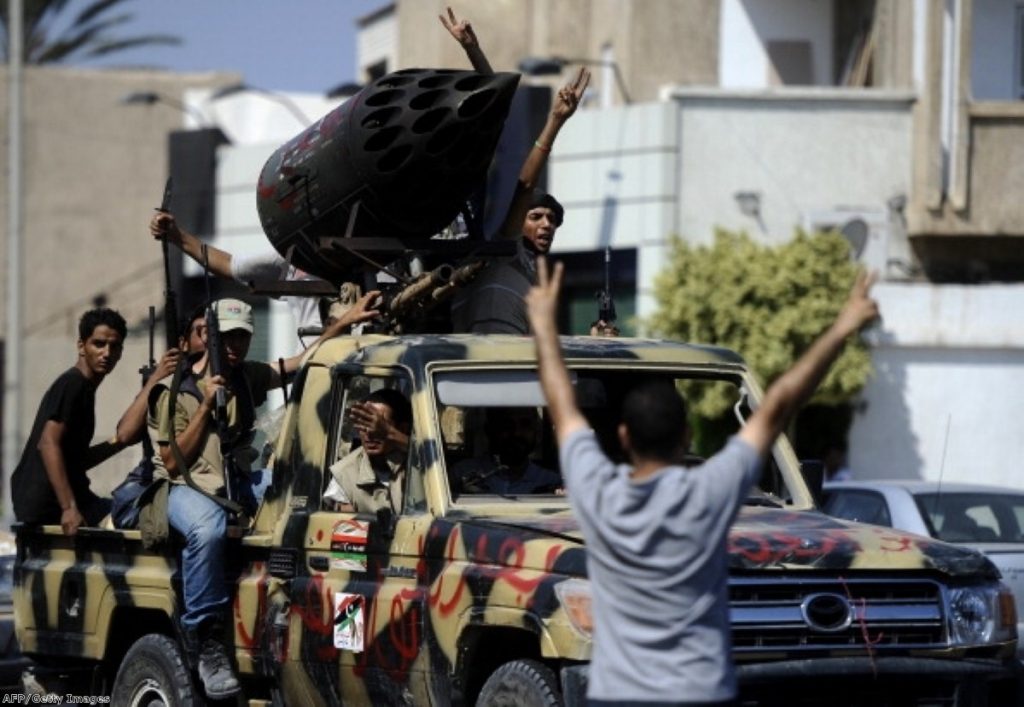Sketch: Far from a victory parade
MPs were still woozy from their long summer holidays. Just how the PM likes 'em.
By Alex Stevenson Follow @alex__stevenson
Political leaders rarely get clean-cut victories as straightforward as Libya. It went on just long enough for people to get the jitters, but ended in the decisive triumph of the rebels just in time for parliament's return this afternoon. David Cameron stuck to the rebels' guns throughout, firm and unwavering, the very model of a modern minor war leader. This was his opportunity to take the credit.
Yet something was not quite right. The Commons did not have the air of fevered anticipation it did when recalled in the depths of summer last month. This afternoon the Labour benches were half-empty, as though half of them had forgotten that this is the first day back at school. There were even some bare patches on the Conservative benches. Only ten Liberal Democrats were seated when the prime minister began speaking. Charles Kennedy, who in his heyday led his party in their vote-winning opposition to the war in Iraq, looked like adding to their number. After briefly peering up into the gallery above, he wandered out on more important business.


So Cameron declined this opportunity for grandstanding, perhaps on the grounds that this wasn't a good crowd. None of his phrases had the rhetorical flourish we had become used to. He was focused on the Libyan authorities getting water into Tripoli, and paying tribute to Britain's armed forces, and the like. "We will not let up until the job is done," he said in a level tone, William Hague nodding to his left. That was when it clicked. This wasn't a 'mission accomplished' ceremony, a la George Bush, because the mission has not yet been accomplished. Gaddafi is still on the run.
The Iraq inquiry has not yet published its findings, but it seems Cameron has already learned the lessons of Tony Blair's conflict. He didn't want to see a 'de-Ba'athification process', in which all members of Saddam's civil service were shut out in the cold. In Libya, police were on the streets and rubbish was being collected. He also appeared to have a clear, pragmatic idea of what was needed next, especially given Tory grandee Nicholas Soames' warning that "matters are about to become a little messy". Tripoli would not be allowed to become another Baghdad, however, nor Benghazi another Baghdad. "It's very important we focus on the things the Libyans want, not the things we think they might want," Cameron said wisely. His frontbench nodded once again.
Ed Miliband was, if anything, more effusive than the PM in his delight at the progress the war has taken. From the start the Labour leader has been more readily effusive in his support for the Libyan intervention than most government ministers. There was much shuddering at what might have been had Britain left Benghazi to Gaddafi's mercy. "We would be wringing our hands," he said.
Miliband was in a more awkward position than Cameron because of revelations that Britain's security services had a cosy relationship with Gaddafi's intelligence agency – and even helped extradite a Libyan rebel-to-be to Tripoli from Hong Kong – during the period when his part was in power. "No part of the British state should ever be complicit in torture," Miliband said, trying not to blink. It looked like every veteran of the last Labour government froze at this, their collective jowls petrified in an unnatural stillness.
Later Jack Straw, the foreign secretary at the time, repeated his earlier denials of foreknowledge. He praised Cameron's leadership, prompting the PM to respond in an oddly kind tone: "I think it's important than nobody rushes to judgement." It felt, not for the first time, that of all New Labour's ministers Cameron respects Straw the most.
Many Labour MPs were absent, but their backbenchers were not bereft of those looking for criticism. David Winnick, one of Labour's more independent MPs, suggested there was a whiff of "hypocrisy" about the government selling the Gaddafi regime "sniper rifles" and "crown control equipment" as recently as early this year. "Far be it from me to join him in attacking the last government," Cameron began, laughing to himself.
MPs appeared sleepy after their long holidays, like woozy bumble bees in a disappointing English summer. They laughed at the prime minister's joke, but soon settled back into quiet dozing. There will come a time, perhaps not before too long, when Cameron will wish they were always this docile.

